|
| |
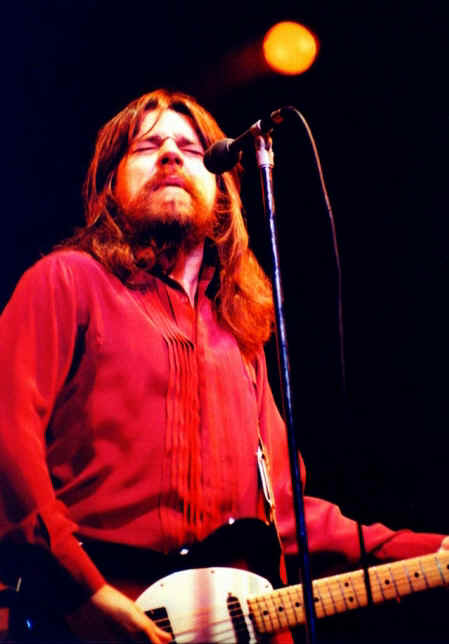
Originally a hard-driving rocker in the vein of fellow Michigan garage-rockers the
Rationals and Mitch Ryder, Bob Seger developed into one of the most popular heartland
rockers over the course of the '70s. Combining the driving charge of Ryder's Detroit
Wheels with Stonesy garage rock and devotion to hard-edged soul and R&B, he crafted a
distinctively American sound. While he never attained the critical respect of his
contemporary Bruce Springsteen, Seger did develop a dedicated following through constant
touring with his Silver Bullet Band. Following several years of missed chances and lost
opportunities, Seger finally achieved a national audience in 1976 with the back-to-back
release of Live Bullet and Night Moves. After the platinum success of those albums, Seger
retained his popularity for the next two decades, releasing seven Top Ten,
platinum-selling albums in a row.
Seger began playing music in 1961 as the leader of the Detroit-based trio the
Decibels; his future manager, Eddie "Punch" Andrews was also a member of the
band. Moving to Ann Arbor, he played with the Town Criers before he became the keyboardist
and vocalist for Doug Brown & the Omens. Billing themselves as the Beach Bums, the
band released "The Ballad of the Yellow Beret," a parody of the Sgt. Barry
Sadler song "The Ballad of the Green Beret." The single was withdrawn shortly
after its release after Sadler threatened a lawsuit. In 1966, Seger released his first
solo single, "East Side Story," which became a regional hit. Several other local
hit singles followed on Cameo Records, including "Persecution Smith" and
"Heavy Music," before his label folded. In 1968, he formed the Bob Seger System
and signed with Capitol Records, releasing his debut album Ramblin' Gamblin' Man in the
spring of that year. The title track became a national hit, climbing to number 17, but the
group's follow-up, Noah, stiffed and Seger decided to quit the music business at the end
of 1969 to attend college.
By the end of the summer, Seger had returned to rock & roll with a new backing
band, releasing Mongrel at the end of the year. For 1971's Brand New Morning, he disbanded
his group and recorded a singer-songwriter effort. Following its release, he began
performing with the duo Dave Teegarden and Skip "Van Winkle" Knape, and the duo
provided support on 1972's Smokin' O.P.'s, which was the first release on Palladium
Records, a label he formed with Andrews. The album failed to sell, as did Back in '72
(1973) and Seven (1974), and he moved back to Capitol Records for 1975's Beautiful Loser.
For the recording of Beautiful Loser, Seger formed the Silver Bullet Band, which consisted
of guitarist Drew Abbott, bassist Chris Campbell, keyboardist Robyn Robbins, saxophonist
Alto Reed and drummer Charlie Allen Martin. Seger supported Beautiful Loser with an
extensive tour with the Silver Bullet Band, and while it didn't make the album a hit, it
provided a wide-spread grass-roots following across the country. The touring paid off in
1976, when Live Bullet, a double-album recorded in Detroit, became a hit, spending over
three years on the US charts and going gold; the album would eventually go quadruple
platinum.
The ground-swell behind Live Bullet sent Seger's next studio album, Night Moves
(1976), into the Top 10 early in 1977. Night Moves became a blockbuster, generating the
hit singles "Night Moves," "Mainstreet" and "Rock & Roll
Never Forgets." Stranger in Town, released in the summer 1978, was just as
successful, featuring the hits "Still the Same," "Hollywood Nights,"
"We've Got Tonite," and "Old Time Rock & Roll." Stranger in Town
confirming his status as one America's most popular rockers. Seger's next album, 1980's
Against the Wind, became his first number one album and all of its big hits - "Fire
Lake," "Against the Wind," "You'll Accomp'ny Me" - were all
ballads. The live album, Nine Tonight, continued his multi-platinum success in 1981,
selling three million copies and peaking at number three.
Seger returned with The Distance in 1982. The Distance was the first album since Seven
to be recorded with the addition of session musicians, which caused guitarist Abbott to
quit the band in frustration. Over the course of the next decade, the membership of the
Silver Bullet Band shifted constantly. While The Distance featured "Shame on the
Moon," his biggest hit single to date, its sales plateaued at a million copies,
suggesting that his popularity was beginning to level off. Seger also began to drastically
reduce his recording and touring schedules - he only released one other album, 1986's Like
a Rock, during the '80s. Like a Rock and its supporting tour were both successes, paving
the way for "Shakedown," a song taken from the soundtrack to Beverly Hills Cop
II, to become Seger's lone number-one hit in 1987. Four years after its release, he
returned with The Fire Inside. Although the album went platinum and reached the Top Ten,
it only appealed to Seger's devoted following, as did 1995's It's a Mystery, which became
his first album since Live Bullet to fail to go platinum, levelling off at gold status.
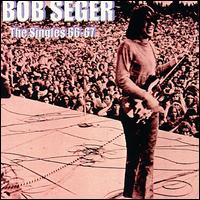
The Singles 1966-1967
Unless you grew up in Michigan in the mid-'60s, you probably have no idea that Seger's
roots extend further than his bar band/road band/singer/songwriter/arena star experiences.
Way back before the '70s, he was one of many talented Michigan garage rockers, releasing
several stomping singles in the style. Some were quite popular regionally, but none made
it nationally; all were far raunchier in execution than anything he's done since. Perhaps
he prefers to keep it in the closet, but these sides have proven very hard to come by;
this compilation, almost certainly unauthorized, gathers together a dozen of them. And
it's good stuff: the sub-"Subterranean Homesick Blues" of "Persecution
Smith," the local hit "East Side Story" (a mini-drama that sounds like
Springsteen as a '60s punk), the satirical "Sock It to Me Santa" and
"Ballad of the Yellow Beret," the storming, twisting "Vagrant Winter,"
and hints of the '70s singer/songwriter in "Heavy Music" and "Looking
Back." Fans of tough '60s rock, indeed, will probably find this superior to most or
all of his subsequent work, although fans of his more famous post-1970 recordings may feel
a little lost. This LP is virtually impossible to locate these days; it's time for the
official reissue of this material, as it can hold its head high next to top-flight
Michigan rock of the time by Mitch Ryder, the Rationals, and others. - Richie Unterberger
01 - (3:05) Persecution Smith
02 - (2:45) Chain Smokin'
03 - (2:32) East Side Story
04 - (2:24) Vagrant Winter
05 - (2:30) Ballad Of The Yellow Berret
06 - (2:29) Heavy Music (Part 1)
07 - (2:18) Sock It To Me Santa
08 - (2:08) Florida Time
09 - (2:28) East Side Sound
10 - (2:23) Very Few
11 - (2:42) Lookin' Back
12 - (2:50) Heavy Music (Part 2)

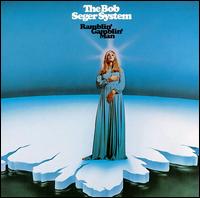
Ramblin' Gamblin' Man - 1968
The Bob Seger System throw everything into Rambin' Gamblin' Man, dabbling in folk,
blues-rock, psychedelia, and piledriving rock & roll synonymous with Detroit. Typical
of such a wide-ranging debut, not everything works. The System stumbles when they take
psychedelic San Franciscan bands on their own turf. Trippy soundscapes like
"Gone" drift into the ether, and the longer jams, "White Wall" and
"Black Eyed Girl," meander. But the stuff that does work are absolute monsters,
highlighted by the title track, a thunderous bit of self-mythology driven by a relentless
rhythm, wailing organ riff, and gospel chorus. It's a stunningly great record and while
nothing here quite equals it; the songs that come close (with the exception of "Train
Man," the first inkling of Seger's knack for reflective, intimate ballads) are
sterling examples of spare, bluesy, angry Michigan rock & roll. "Tales of Lucy
Blue" has a spooky, menacing edge, "Ivory" a great Motown-styled raver, and
"Down Home" rides a manic riff and a simple blues harp to be one of the best
rockers on the record. Then there's "2 +2 = ?," a ferocious anti-war song in the
vein of Creedence Clearwater Revival's "Fortunate Son," but here Seger can't
imagine why the nice guy in high school is now buried in the mud. It's a frightening,
visceral song that stands among the best anti-Vietnam protests. Finally, the album closes
with "The Last Song (Love Needs to Be Loved)," an unabashed peace, love, n'
understanding anthem styled in the manner of West Coast hippie pop, particularly Love.
It's atypical of anything on the album or anything Seger would ever do again, but in many
ways, it's the perfect way to close an exciting, flawed debut that winds up being a symbol
of its times by its very diversity. - Stephen Thomas Erlewine
01 - (2:22) Ramblin' Gamblin' Man
02 - (2:29) Tales Of Lucy Blue
03 - (2:24) Ivory
04 - (3:29) Gone
05 - (3:03) Down Home
06 - (4:08) Train Man
07 - (5:22) White Wall
08 - (6:36) Black Eyed Girl
09 - (2:50) 2 + 2 = ?
10 - (1:06) Doctor Fine
11 - (3:05) The Last Song (Love Needs To Be Loved)

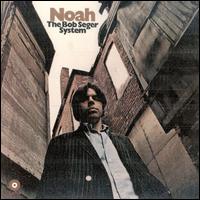
Noah - 1969
For reasons never entirely explained, Bob Seger suffered a bit of a breakdown shortly
after "Ramblin Gamblin Man" so he decided to bring Tom Neme, a
guitarist/pianist, into the Bob Seger System to help lighten the load and share the
burden. Thing is, Neme wound up taking over the band. It's hard to tell whether Seger
endorsed his mutiny or if he was just so disinterested that he didn't put up a fight, but
all the same, the second Seger album, Noah, is one strange affair. The band makes no
secret of the change, stating on the back cover that "Seger will always be Bob Seger,
(but) any change must come from the System and Tom Neme." So, the liner notes seem
like a way to gloss over a real lack of leadership or a coup, depending on your point of
view. This release holds together better than it would seem, but it's still an awkward
album that's never sure where it wants to go. Ironically, Neme tries to replicate Seger's
hard-driving rock songs several times throughout the album while Seger sounds more
comfortable with the folky shuffle of the title track. Of course, he can still tear it up
with "Innervenus Eyes," and he delves deeper into darkness than he ever has with
the weirdly intense, claustrophobic closer "Death Row." No matter how good these
individual cuts may be - and they're certainly worth the time of any devoted fan - they
still are isolated moments on the only album where he sounds tentative, confused, and
disinterested. In other words, the only album where Seger doesn't seem like he'll always
be Seger. - Stephen Thomas Erlewine
01 - (2:26) Noah
02 - (2:49) Innervenus Eyes
03 - (3:11) Lonely Man
04 - (3:02) Loneliness Is A Feeling
05 - (6:11) Cat
06 - (3:02) Jimpin' Humpin' Hip Hypocrite
07 - (3:27) Follow The Children
08 - (3:06) Johnson, Lennie
09 - (4:01) Paint Them A Picture Jane
10 - (2:56) Death Row

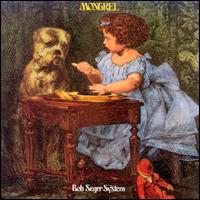
Mongrel - 1970
Most artists that deliver a second record as shaky as Noah fold on their third album.
Not Bob Seger. He reasserted control of the System, consigning Tom Neme to a fanboy's
footnote, and returning the group to the piledriving rock that was his trademark. All of
this was evident with his third album, the superb Mongrel. Never before, and never since,
has Seger rocked as recklessly and viciously as he did here - after a spell in the
wilderness, he's found his voice. He's so assured, he elevates his Ramblin' Gamblin' Man
characters Lucy Blue and Chicago Green to mythic status in the pulverizing
"Lucifer," perhaps the greatest song on this lean, muscular record. That
assurance carries over not just through the ferocious rockers that dominate the album -
"Evil Edna," "Highway Child," "Leanin on My Dream," and
"Song to Rufus" all hit harder than latter-day MC5 - but to quieter moments like
"Big River," where he first hits upon the wistful, passionate ballad style later
popularized with "Night Moves." The fact that the System connects on both
illustrates that Seger is not just fronting an excellent band, but that he's developing
into a first-class songwriter. Put it this way - the only time the System sounds ill at
ease is when they tackle "River Deep - Mountain High," and that's not because
they're ill-suited to the epic - it's because they find the lie in the song's artificial
pretensions and deliver a performance that eclipses the song itself. That two-fisted punch
of terrific performances and songs is unexpected, especially after an album as conflicted
as Noah, but the truly remarkable thing is that Mongrel showcases a band so powerful and a
songwriter so distinctive, that it still sounds white-hot decades after its release. -
Stephen Thomas Erlewine
01 - (2:43) Song To Rufus
02 - (3:10) Evil Edna
03 - (2:52) Highway Child
04 - (3:12) Big River
05 - (2:24) Mongrel
06 - (2:26) Lucifer
07 - (2:03) Teachin' Blues
08 - (3:19) Leanin' On My Dream
09 - (4:12) Mongrel Too
10 - (7:28) River Deep - Mountain High

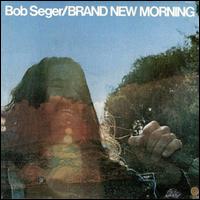
Brand New Morning - 1971
Mongrel may have been a terrific album, but nobody heard it, just like its predecessor.
So Capitol was ready to drop him and wanted a contract-fulfilling album as soon as
possible. Seger delivered the low-key, introspective Brand New Morning to get out of the
deal. Later he claimed that the album was a collection of demos released somewhat against
his will, but listening to the record it's hard to believe that these intimate yet fully
realized songs were bare-bone work versions. Furthermore, it's hard to see these as just a
collection of tossed-off tunes, since they're well-rounded and uniformly engaging, not
throwaways. In light of Seger's past prior to Brand New Morning and the records that
followed it, it's easy to see why he's disowned it, since it's no rock & roll album -
it's a singer/songwriter album. It's the first and only time that his ambitions as a
songwriter are laid bare, which may make it uncomfortable for him in retrospect. He
needn't be worried since Brand New Morning is a fine album on its own terms. Yes, none of
the songs resonate as deeply as the best ballads on his other records, and there are times
where it feels like he's very conscious of proving himself as a writer, but, in light of
his later work, that's quite charming. That's what makes the album something more than a
curiosity and into something quietly pivotal in Seger's catalog. There are no classics
here (though the title track, "Maybe Today," "Sometimes," and
"Railroad Days" are all very good), but the charm of the record is hearing Seger
consciously working on his craft. He's occasionally too earnest, or a little precious, yet
it's an endearing transitional album. - Stephen Thomas Erlewine
1 - (3:30) Brand New Morning
2 - (3:17) Maybe Today
3 - (5:21) Sometimes
4 - (3:24) You Know Who You Are
5 - (7:00) Railroad Days
6 - (2:53) Louise
7 - (4:41) Song For Him
8 - (3:31) Something Like

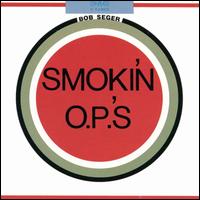
Smokin' O.P.'s - 1972
Bob Seger closed out his Capitol contract with Brand New Morning, a singer/songwriter
album quite unlike anything he had yet released. Following its release he moved to the
Detroit-based label Palladium and returned to hard-driving rock & roll with Smokin'
O.P.'s, the polar opposite of Brand New Morning. According to legend, the title stands for
"smoking other people's songs," which makes sense since this is a cover album
that even covers Bob Seger & the Last Heard. In other words, it's nothing like the
intimate, reflective, risky Brand New Morning, but that doesn't matter since it rocks so
good and since it reveals that Seger isn't just a first-class bandleader and rock
songwriter, but that he's a terrific interpreter of other writer's songs. Even well-worn
tunes like "Bo Diddley" and "If I Were a Carpenter" get made fresh by
internalizing the hooks, turning them into something fresh and original. That's also true
of songs by such contemporaries as Stephen Stills ("Love the One You're With")
and Leon Russell ("Humming Bird"), and he also breathes fire into blues and rock
stalwarts like "Let It Rock," "Turn on Your Love Light," and
"Jesse James." Smokin' O.P.'s closes out with two originals, one new (the fine,
but not especially noteworthy "Someday") and one old (the perennial "Heavy
Music"). Neither change the essential character of the album, which is just a really
fun, hard-rocking record that bought Seger some time while re-asserting the fact that he
could really rock. He could - and he could rock really well - which is why Smokin' O.P.'s
remains a lot of fun, even if it's a relatively minor work in Seger's canon. - Stephen
Thomas Erlewine
1 - (6:19) Bo Diddley
2 - (4:19) Love The One You're With
3 - (3:48) If I Were A Carpenter
4 - (3:48) Hummin' Bird
5 - (3:26) Let It Rock
6 - (4:46) Turn On Your Love Light
7 - (3:27) Jesse James
8 - (2:32) Someday
9 - (2:29) Heavy Music

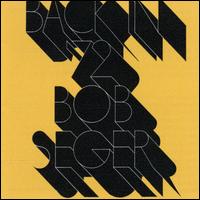
Back In '72 - 1973
Returning to independent status, Bob Seger recorded Back in '72, not only the finest of
his early-'70s albums but one of the great lost hard rock albums of its era. Seger didn't
limit himself to self-penned songs on this excursion; borrowing an idea from Smokin'
O.P.s, he covers quite a few tunes, providing a balance to his own tunes. He makes
"Midnight Rider" sound as if it were a Motor City raver instead of a sultry,
late-afternoon Southern rocker, while casually tossing off "Rosalie," an
irresistible ode to a local DJ that turned into a hard rock anthem when Thin Lizzy decided
to record it later in the decade. That's the brilliance of Back in '72 - there's no
separation between the original and cover, it's all united in a celebration of rock &
roll. That's why "Turn the Page," perhaps the weariest travelogue ever written,
never feels self-pitying - that's just the facts, according to a first-rate Midwestern
band that never got a break. All the same, Back in '72 is a testament to great rock &
roll, thanks to Seger's phenomenal songwriting and impassioned playing. - Stephen Thomas
Erlewine
1 - (2:47) Midnight Rider
2 - (2:46) So I Wrote You A Song
3 - (2:54) Stealer
4 - (3:26) Rosalie
5 - (5:14) Turn The Page
6 - (4:26) Back In '72
7 - (3:37) Neon Sky
8 - (4:36) I've Been Working
9 - (5:40) I've Got Time

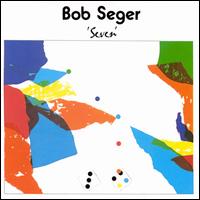
Seven - 1974
With his seventh album, appropriately titled Seven, Bob Seger delivered one of his
strongest, hardest-hitting rock records - the toughest since the days of the Bob Seger
System. Not to say that he ever abandoned rock & roll, since Back in '72 was filled
with fantastic rockers, but it was tempered with reflective singer/songwriter material.
Not here. Even the slowest song, "20 Years From Now," is a steady mid-tempo
ballad that showcases the band. Still, that's a rare moment of reflection on a record that
opens with "Get Out of Denver," the greatest Chuck Berry knock-off ever written,
and never loses momentum. Great, raucous rockers pile up one after the other as Seger
spins out barroom anthems ("Seen a Lot of Floors"), anti-establishment tirades
("Long Song Comin'," "Cross of Gold"), jokes ["U.M.C. (Upper
Middle Class)"], bluesy rock ("All Your Love"), and simple garage rockers
("Need Ya," "School Teacher"). Only nine songs, lasting just over a
half hour, but it's one of the most infectious sets Seger ever cut, proving that he wasn't
just a dynamite rocker, but he had the songs to match. And, again, it didn't have any
success - it didn't even chart, actually. That doesn't change the fact that this is one of
his very best albums. - Stephen Thomas Erlewine
1 - (2:43) Get Out Of Denver
2 - (4:32) Long Song Comin'
3 - (3:24) Need Ya
4 - (2:48) School Teacher
5 - (2:24) Cross Of Gold
6 - (3:12) U.M.C. (Upper Middle Class)
7 - (3:01) Seen A Lot Of Floors
8 - (4:33) 20 Years From Now
9 - (4:30) All Your Love


Tales Of Lucy Blue: The Best Of Bob Seger 1966-1975
01 - (2:37) Heavy Music
02 - (2:29) East Side Story
03 - (3:06) Persecution Smith
04 - (2:29) Tales Of Lucy Blue
05 - (2:49) 2+2=?
06 - (2:34) Down Home
07 - (2:27) Lucifer
08 - (3:14) Big River
09 - (3:13) Leanin' On My Dream
10 - (2:43) Lookin' Back
11 - (2:48) Louise
12 - (6:54) Railroad Days
13 - (4:21) Back In '72
14 - (5:15) Turn The Page
15 - (3:33) Neon Sky
16 - (4:29) Long Song Comin'
17 - (2:23) Cross Of Gold
18 - (2:46) School Teacher
19 - (2:56) Fine Memory
20 - (3:50) Freight Train [Live]
21 - (4:41) Sail On [Live]
22 - (4:34) Someday [Live]
23 - (4:26) All Your Love [Live]

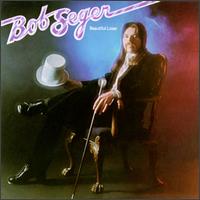
Beautiful Loser - 1975
Beautiful Loser winds up sounding more like Back in '72 than its immediate predecessor,
Seven, largely because Bob Seger threaded reflective ballads and mid-tempo laments back
into his hard-driving rock. He doesn't shy away from it, either, opening with the lovely
title track. And why shouldn't he? These ballads were as much a part of his success as his
storming rockers, since his sentimental streak seemed all the more genuine when contrasted
with the rockers. If anything, Beautiful Loser might err a little bit in favor of
reflection, with much of the album devoted to introspective, confessional mid-tempo cuts.
There are a couple of exceptions to the rule, of course - "Katmandu" roars with
humor, and his cover of "Nutbush City Limits" shames Tina Turner's original -
but they are the only full-throttle rockers here, with "Black Night" coming in
as a funky, swaggering cousin. It's the exact opposite of Seven, in other words, and in
its own way, it's just as satisfying. Occasionally, it might be a little too sentimental
for some tastes, but it's all heartfelt and he's written some terrific songs here, most
notably the album's heart of "Jody Girl" and "Travelin' Man." Seger
has started turning inward, searching his soul in a way he hadn't since the since disowned
Brand New Morning, and, in doing so, he was setting the stage for his first genuine
blockbuster. - Stephen Thomas Erlewine
1 - (3:31) Beautiful Loser
2 - (3:25) Black Night
3 - (6:11) Katmandu
4 - (3:42) Jody Girl
5 - (2:42) Travelin' Man
6 - (3:23) Momma
7 - (3:58) Nutbush City Limits
8 - (3:19) Sailing Nights
9 - (2:58) Fine Memory

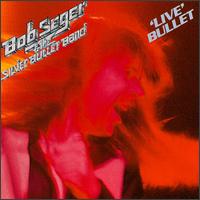
Live Bullet - 1976
Live Bullet introduced Bob Seger to a wide audience, revealing a rocker of unbridled
passion and a songwriter of considerable talent. Prior to its release, Seger had been
toiling away, releasing seven albums and touring constantly ever since his debut scraped
the national consciousness in 1968. The psychedelicized days of Ramblin' Gamblin' Man are
long gone on Live Bullet, leaving behind a rocker who loved the Stones for their
toughness, Dylan for his honesty, and Chuck Berry for his narrative - and one who found
his own sound when the Silver Bullet Band came into their own through countless tours.
Live Bullet was recorded live at Detroit's Cobo Hall, in front of a passionate, loving
hometown audience spurring him into a great performance. The song selection relies heavily
on Beautiful Loser, yet it dips into the previous albums enough to prove that Seger had
been delivering consistently as a songwriter for years. But what really sold Live Bullet
is how these terrific songs are delivered with a ferocious, committed intensity. This
might not be much more than a simple rock & roll album, but it's one of the best of
its kind, establishing Seger, in the eyes of skeptics, as a first-rate performer and
writer. Here, "Heavy Music," "Get Out of Denver," "Turn the
Page," and "Ramblin' Gamblin' Man" all become hard rock classics, as does
the band itself. It's a rare occasion when a double live album captures an artist at an
absolute peak, while summarizing his talents, and that's exactly what Live Bullet does. -
Stephen Thomas Erlewine
01 - (4:38) Nutbush City Limits [Live]
02 - (4:55) Travelin' Man [Live]
03 - (4:01) Beautiful Loser [Live]
04 - (4:30) Jody Girl [Live]
05 - (4:36) I've Been Working [Live]
06 - (5:07) Turn The Page [Live]
07 - (3:18) U.M.C. (Upper Middle Class) [Live]
08 - (5:41) Bo Diddley [Live]
09 - (3:02) Ramblin' Gamblin' Man [Live]
10 - (8:16) Heavy Music [Live]
11 - (6:25) Katmandu [Live]
12 - (2:37) Lookin' Back [Live]
13 - (5:23) Get Out Of Denver [Live]
14 - (8:32) Let It Rock [Live]

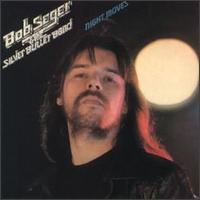
Night Moves - 1976
Seger recorded the bulk of Night Moves before Live Bullet brought him his first genuine
success, so it shouldn't come as a surprise that it's similar in spirit to the
introspective Beautiful Loser, even if it rocks harder and longer. Throughout much of the
album, he's coming to grips with being on the other side of 30 and still rocking. He
floats back in time, turning in high school memories, remembering when wandering down
"Mainstreet" was the highlight of an evening, covering a rockabilly favorite in
"Mary Lou." Stylistically, there's not much change since Beautiful Loser, but
the difference is that Seger and his Silver Bullet Band - who turn in their first studio
album here - sound intense and ferocious, and the songs are subtly varied. Yes, this is
all hard rock, but the acoustic ballads reveal the influence of Dylan and Van Morrison,
filtered through a midwestern sensibility, and the rockers reveal more of Seger's
personality than ever. Seger may have been this consistent before (on Seven, for example),
but the mood had never been as successfully varied, nor had his songwriting been as
consistent, intimate, and personal. Thankfully, this was delivered to a mass audience
eager for Seger, and it not only became a hit, but one of the universally acknowledged
high points of late-'70s rock & roll. And, because of his passion and craft, it
remains a thoroughly terrific record years later. - Stephen Thomas Erlewine
1 - (3:53) Rock & Roll Never Forgets
2 - (5:27) Night Moves
3 - (4:29) The Fire Down Below
4 - (5:15) Sunburst
5 - (4:39) Sunspot Baby
6 - (3:44) Mainstreet
7 - (3:12) Come To Poppa
8 - (3:25) Ship Of Fools
9 - (2:57) Mary Lou

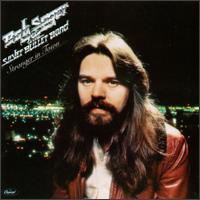
Stranger In Town - 1978
Night Moves was in the pipeline when Live Bullet hit and that album wound up eclipsing
the double-live set anyway, so Stranger in Town is really the record where Bob Seger
started grasping the changes that happened when he became a star. It happened when he was
old enough to have already formed his character. Even as celebrity creeps in, as on
"Hollywood Nights," Seger remains a middle-class, midwestern rocker, celebrating
"Old Time Rock & Roll," realizing old flames are still the same and still
feeling like a number. Musically, it's as lively as Night Moves, rocking even harder in
some places and being equally as introspective in the acoustic numbers. If it doesn't feel
as revelatory as that record, in many ways it does feel like a stronger set of songs. Yes,
musically, it doesn't offer any revelations, but it still feels impassioned, both in its
performances and songs, and it's still one of the great rock records of its era. [Reissued
in late 2001 in a 24-bit remastered edition with startlingly improved sound - from the
opening bars of "Hollywood Nights", this is a much "hotter" disc,with
band sounding like it's in the room with you, Bill Payne's rippling piano, Drew Abbott's
crunchy guitar, and Dave Teagarden's drums up close and personal, and it gets better from
there,and all at a much higher volume than even the mid-1990's Greatest Hits CD - Stephen
Thomas Erlewine
1 - (5:04) Hollywood Nights
2 - (3:24) Still The Same
3 - (3:17) Old Time Rock And Roll
4 - (3:56) Till It Shines
5 - (3:46) Feel Like A Number
6 - (4:16) Ain't Got No Money
7 - (4:42) We've Got Tonight
8 - (6:24) Brave Strangers
9 - (5:12) The Famous Final Scene

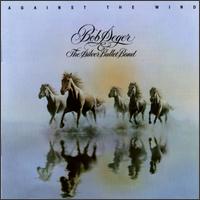
Against The Wind - 1980
Though there are still some traces of the confessionals that underpinned Beautiful
Loser through Stranger in Town, Against the Wind finds Bob Seger turning toward craft.
Perhaps he had to, since Against the Wind arrived after three blockbuster albums and
never-ending tours. Even so, this record winds up not feeling as immediate or as soulful
as its predecessors, especially since it begins with a tossed-off rocker called "The
Horizontal Bop," possibly his most careless tune since "Noah." It's fun,
but once it's done, the record really starts to kick into high gear with "You'll
Accomp'ny Me," a ballad the equal of anything on its two predecessors. Throughout
Against the Wind, Seger winds up performing better on the ballads than the rockers, which,
while good, tend to sound a little formulaic. Still, Seger's formula is good and if
"Her Strut" and "Betty Lou's Gettin' Out Tonight" would have been
second stringers on Stranger in Town, they offer a nice balance here, and the rest of the
record alternates between similarly well-constructed rockers and introspective ballads
like "Against the Wind" and "Fire Lake." Compared to its predecessors,
this does feel a little weak, but compared with its peers, it's a strong, varied heartland
rock album that finds Seger at a near peak. - Stephen Thomas Erlewine
01 - (4:04) The Horizontal Bop
02 - (4:01) You'll Accomp'ny Me
03 - (3:56) Her Strut
04 - (3:45) No Man's Land
05 - (4:19) Long Twin Silver Line
06 - (5:36) Against The Wind
07 - (4:05) Good For Me
08 - (2:53) Betty Lou's Gettin' Out Tonight
09 - (3:34) Fire Lake
10 - (4:29) Shinin' Brightly

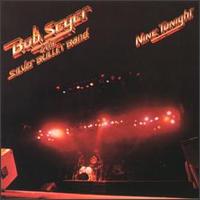
Nine Tonight - 1981
Features the title-track contribution to the Urban Cowboy movie soundtrack and an
effective cover of "Trying to Live My Life Without You." - Cub Koda
01 - (5:16) Nine Tonight [Live]
02 - (4:05) Trying To Live My Life Without You [Live]
03 - (4:13) You'll Accomp'ny Me [Live]
04 - (4:51) Hollywood Nights [Live]
05 - (5:19) Old Time Rock And Roll [Live]
06 - (4:13) Mainstreet [Live]
07 - (5:29) Against The Wind [Live]
08 - (4:48) The Fire Down Below [Live]
09 - (3:58) Her Strut [Live]
10 - (4:12) Feel Like A Number [Live]
11 - (3:52) Fire Lake [Live]
12 - (3:00) Betty Lou's Gettin' Out Tonight [Live]
13 - (4:57) We've Got Tonight [Live]
14 - (5:45) Night Moves [Live]
15 - (3:36) Rock & Roll Never Forgets [Live]
16 - (6:20) Let It Rock [Live]

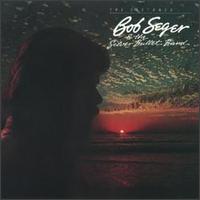
The Distance - 1982
The Distance was hailed as a return to form upon the time of its release and, in many
ways, it might be a little stronger, a little more consistent than its predecessor,
Against the Wind. Still, this album has the slickest production Seger had yet granted and
the biggest hit single on The Distance wasn't written by him, it was a cover of Rodney
Crowell's "Shame on the Moon." Now, this wasn't entirely unusual, since Seger
had been an excellent interpreter of songs for years, but this, combined with the glossy
sound, signaled that Seger may have been more concerned with his status as a popular,
blue-collar rocker than his music. Not that there's much to fault with the music, since
"Even Now" and "Roll Me Away" are easily two of his classics, and he
turns out craftsmanlike rockers like "Makin' Thunderbirds" and "Boomtown
Blues" with aplomb. For all its attributes, it feels like a mirror image of Against
the Wind, an album where the rockers, on the whole, wind up being more convincing than the
ballads. Now, that doesn't mean that The Distance is a bad record, since it isn't - it's
filled with first-rate heartland rockers - but Seger at his best could balance rockers
with ballads or, if he concentrated on rockers, it would be more ferocious than this. This
album is simply solid, a nice addition to his catalog, but not a knockout. - Stephen
Thomas Erlewine
1 - (4:34) Even Now
2 - (3:01) Makin' Thunderbirds
3 - (3:41) Boomtown Blues
4 - (4:59) Shame On The Moon
5 - (4:30) Love's The Last To Know
6 - (4:42) Roll Me Away
7 - (4:04) House Behind A House
8 - (6:10) Comin' Home
9 - (5:52) Little Victories

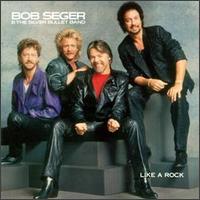
Like A Rock - 1986
At times sounding like a poor man's Springsteen, Bob Seger continued to mine the fields
he'd plowed so well over previous efforts. There's the send-up of the U.S.A. in
"American Storm," and the hard-rockin' "Sometimes," and the
heartbreakingly beautiful "Somewhere Tonight." Oh yes, and the song used in
those incessant commercials for American pickup trucks, "Like a Rock." A mature
effort from a great American talent. - James Chrispell
01 - (4:19) American Storm
02 - (5:58) Like A Rock
03 - (4:42) Miami
04 - (5:37) The Ring
05 - (4:33) Tightrope
06 - (3:32) The Aftermath
07 - (3:32) Sometimes
08 - (4:04) It's You
09 - (4:27) Somewhere Tonight
10 - (3:18) Fortunate Son

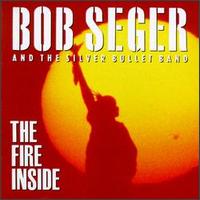
The Fire Inside - 1991
Michigan's Bob Seger is an American treasure, but he doesn't get the full respect or
attention of, say, Bruce Springsteen or John Mellencamp because he wasn't as visible. His
late-'70s prime was pre-MTV, New Jersey-born Springsteen had the fawning support of the
New York-based media, and Mellencamp embraced high-profile political causes like Farm Aid
and married model Elaine Irwin. 1991's The Fire Inside is credited to Bob Seger and the
Silver Bullet Band, but that's misleading. Keyboardist Craig Frost plays on most of the
songs, but saxophonist Alto Reed and bassist Chris Campbell are virtually MIA. Instead,
Seger uses countless special guests. So many, in fact, that listing them all would eat up
this review space, but they include Joe Walsh, Bruce Hornsby, Roy Bittan, Steve Lukather,
Don Was, Waddy Wachtel, Rick Vito, Mike Campbell, Patty Smyth, Lisa Germano, and Kenny
Aronoff. Overall, the 12-track album is a disappointing piecemeal effort with five
different production credits, and Seger uses two Tom Waits covers and one other outside
song to pad it. "The Real Love" was a Top 40 hit and this acoustic guitar-based
song is indicative of Seger's gift for writing mid-tempo ballads. "Real at the
Time" is propelled by the kind of passion generally lacking elsewhere here. The
tremendously rewarding "The Fire Inside" lives up to its name. On this career
highlight, Seger's great lyrics poetically describe the frailty of human emotion but the
passion in our never-ending yearnings; Bittan's bright piano melody and Russ Kunkel's
crisp, forceful drumming help Seger sing with inspired resonance. Walsh and Seger actually
engage in a guitar duel on "The Mountain." The spunky rocker "She Can't Do
Anything Wrong" ends The Fire Inside on a high note, but it's not enough to make the
album cohesive. - Bret Adams
01 - (3:42) Take A Chance
02 - (4:41) The Real Love
03 - (3:40) Sightseeing
04 - (3:54) Real At The Time
05 - (4:15) Always In My Heart
06 - (5:58) The Fire Inside
07 - (3:27) New Coat Of Paint
08 - (3:58) Which Way
09 - (6:47) The Mountain
10 - (4:26) The Long Way Home
11 - (4:24) Blind Love
12 - (3:39) She Can't Do Anything Wrong

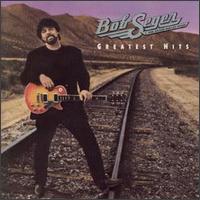
Greatest Hits - 1994
For over 20 years, Bob Seger has been one of the best mainstream rock & rollers in
America, developing a distinctive body of honest, hard-rocking songs. More songs that can
be put on this single-disc set, unfortunately. While many of Seger's trademarks are here -
"Turn the Page," "Old Time Rock N' Roll," "Night Moves" -
there is no "Rock and Roll Never Forgets," "Katmandu," "Shame on
the Moon," or any of his pulverizing early records, when he was as tough as fellow
Michigan rockers the MC5 and the Stooges; this is one time when a double-disc set would
have held enough quality material. Nevertheless, what is here is fine and contains enough
first-rate material to satisfy most fans. - Stephen Thomas Erlewine
01 - (4:41) Roll Me Away
02 - (5:27) Night Moves
03 - (5:05) Turn The Page
04 - (4:01) You'll Accomp'ny Me
05 - (5:04) Hollywood Nights
06 - (3:21) Still The Same
07 - (3:16) Old Time Rock And Roll
08 - (4:41) We've Got Tonight
09 - (5:35) Against The Wind
10 - (3:43) Mainstreet
11 - (5:57) The Fire Inside
12 - (5:56) Like A Rock
13 - (3:01) C'Est la Vie
14 - (3:07) In Your Time

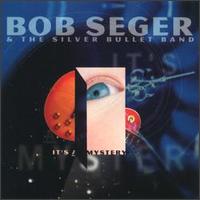
It's A Mystery - 1995
Since Bob Seger's mid-tempo, Middle American rock sound remains constant - the drums in
the pocket, the guitars chugging along, the vocals husky and choked - it's the variables
of performance and composition that separate his good albums from his great ones. On both
counts, It's a Mystery is not great. Both as writer and performer, Seger seems tired and
bitter. Always a reflective, backward-looking lyricist, Seger is full of regret on
"Lock and Load" (one of four songs that contain references to firearms,
including a cover of Tom Waits' "16 Shells From a 30-06"), and in "Rite of
Passage," among other songs, he gives us a critical view of the state of the nation.
The most personal of these complaints is "Revisionism Street," which criticizes
the scandal mongers who prey upon stars like himself. Though Seger assembles a revolving
group of ace session players, including E Street Band keyboardist Roy Bittan and members
of Little Feat (the Silver Bullet Band has been a myth for a long time), the playing is
formulaic. Though Seger had the usual four years to put this album together, he doesn't
seem to have been ready to record, either in terms of coming up with enough quality
material or getting his performing chops up. And he is at a point in his career where he
can no longer coast: After racking up ten straight million-selling albums, Seger only
reached gold with It's a Mystery, which became his first album since 1976 to miss the Top
Ten. Meanwhile, his 1994 Greatest Hits album continued to rack up healthy sales,
indicating that, as of 1995, Bob Seger was well on his way to becoming an oldies act. -
William Ruhlmann
01 - (3:52) Rite Of Passage
02 - (4:57) Lock And Load
03 - (3:27) By The River
04 - (5:24) Manhattan
05 - (4:08) I Wonder
06 - (4:20) It's A Mystery
07 - (3:49) Revisionism Street
08 - (2:26) Golden Boy
09 - (3:57) I Can't Save You Angelene
10 - (4:21) 16 Shells From A 30-6
11 - (4:38) West Of The Moon
12 - (4:45) Hands In The Air

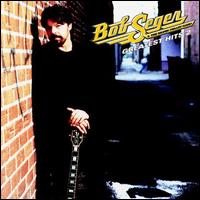
Greatest Hits Vol. 2 - 2003
In 2003, when Deluxe Editions and Definitive Collections were the name of the game in
reissues, it was refreshing to see Bob Seger's defiantly retro Greatest Hits, Vol. 2 hit
the shelves. The title and the approach hark back to the days when a hits compilation was
followed a few years later by a supplement, covering roughly the same territory and adding
a few new singles. Seger's first Greatest Hits had all the big hits, from "Night
Moves" to "Old Time Rock and Roll," and while it was very effective at that
level, many of his big hits were ballads, so by extension the hits collection downplayed
his rock & roll, which is was kind of odd for a singer/songwriter known as a
passionate rocker. And while there was no arguing with what was on Greatest Hits, it left
off many songs that illustrated his depth as a songwriter - and that's not even counting
that it left his handful of non-LP singles and songs unaccounted for or the fact that it
ignored his early Cameo/Parkway singles, the Bob Seger System, or his first seven albums.
Greatest Hits, Vol. 2 solves a lot of these problems and is a stronger album than the
first Greatest Hits because of it. While it's still frustrating that Seger ignores his
early material (the Cameo/Parkway songs are owned by somebody else, but he certainly could
dip into the first seven albums, at least for "Rambling Gambling Man"), it's
also true that they're of a different aesthetic than the anthemic blue-collar rock that he
first etched out on 1975's Beautiful Loser. That is the music that made him a star, and
that's the music that fuels this collection, all the way through to the lesser-known
latter-day sides "Manhattan" and "New Coat of Paint," as well as the
brand-new cuts "Satisfied" and "Tomorrow," two hard-rocking songs that
are some of his best music in years. These are good, but they are naturally overshadowed
by the songs that form the heart of this collection: the terrific plea for compassion
"Understanding," previously only available on the soundtrack to Teachers;
grinding hard rockers "The Fire Down Below," "Her Strut," and
"Sunspot Baby"; the delrious Chuck Berry homage "Katmandu," one of his
funniest and toughest songs; the country-tinged ballads "Shame on the Moon" and
"Fire Lake"; the aching elegy "Beautiful Loser"; the life-afirming
"Rock & Roll Never Forgets," one of the best songs about aging within rock
& roll. In this context, even the too-produced heavily synthesized
"Shakedown" - his contribution to 1987's Beverly Hills Cop II and his only
number one hit, never available on a Seger album until now - turns into a good time. Sure,
there are a few songs that probably should have made the cut - most notably "Feel
Like a Number" and "Even Now" - but as it stands, Greatest Hits, Vol. 2 is
an excellent supplement to the first collection and a hell of a lot more fun to listen to
as well. - Stephen Thomas Erlewine
01 - (3:45) Understanding
02 - (4:29) The Fire Down Below
03 - (3:52) Her Strut
04 - (3:29) Beautiful Loser
05 - (4:39) Sunspot Baby
06 - (6:11) Katmandu
07 - (4:54) Shame On The Moon
08 - (3:32) Fire Lake
09 - (4:12) Tryin' To Live My Life Without You [Live]
10 - (4:04) Shakedown
11 - (5:25) Manhattan
12 - (3:30) New Coat Of Paint
13 - (4:19) Chances Are {Hope Floats}
14 - (3:53) Rock And Roll Never Forgets
15 - (3:31) Satisfied
16 - (3:41) Tomorrow

|